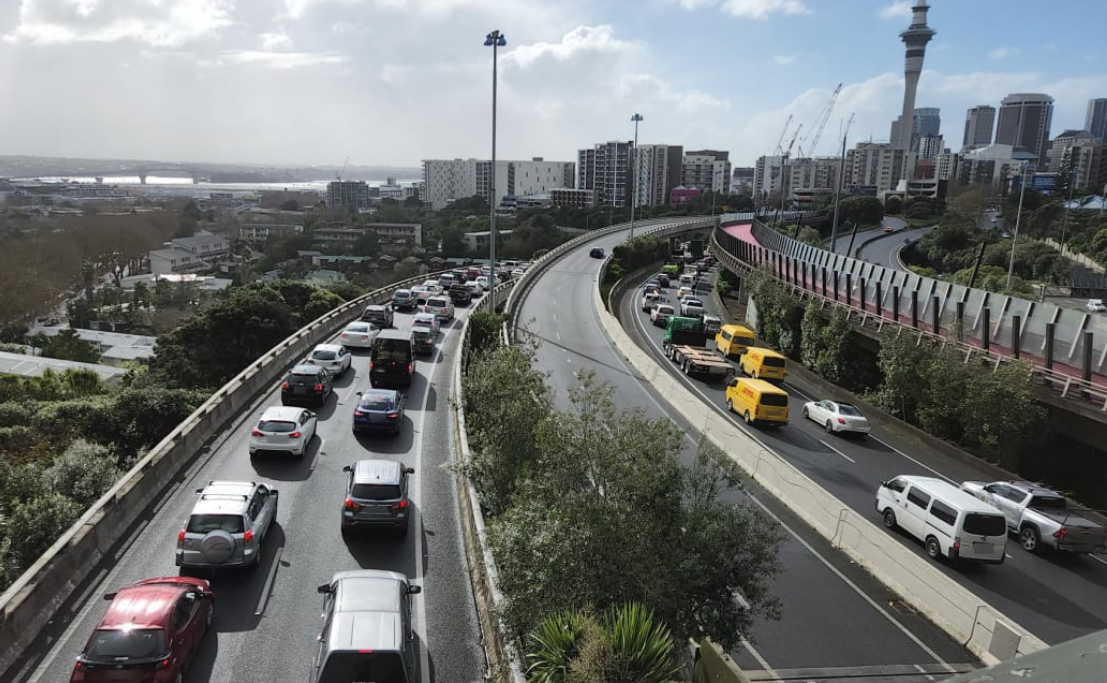
Environmental groups warn it is an "unprecedented assault on nature and democracy".
Four government ministers unveiled the plan for a fast-track regime on Thursday morning - one of the final commitments in the government's 100-day plan.
It gives ministers the final call on whether to approve projects, after recommendations from an expert panel, with no requirement to seek comment from the public or hold a hearing.
'This will make New Zealand a banana republic' - Labour
Labour's environment spokesperson Rachel Brooking, in a statement, said the decision showed the government's "ears are well and truly taken by lobbyists".
"This Bill hands lobbyists and ministers the keys to our country without transparency when it comes to our resources. The greed of corporations both foreign and local could reshape New Zealand," she said.
"This will make New Zealand a banana republic where a minister can be lobbied to make a decision and can disregard the interests of the public. We should not decide what happens in New Zealand via lobbyists with fat wallets."
She said the idea of Regional Development Minister Shane Jones and Infrastructure Minister Chris Bishop having the final say without the input of experts and communities was frightening.
"Labour had appropriate legislation and processes for both fast track consents and longer-term Resource Management Act reform. Pitching this as a solution for red - or green - tape helps no one except lobby groups. It is not the way forward for New Zealanders, it does not help infrastructure and will not be effective."
'A free pass to bulldoze New Zealand's precious native wildlife' - Greens
Outgoing Green Party co-leader James Shaw said what was proposed was "one of the most significant assaults on the environment undertaken by any government in my lifetime".
In a statement, he said the government was giving big industry a free pass to bulldoze New Zealand's precious native wildlife.
"Ministers are handing themselves extraordinary powers to approve projects that could include new coal mines, mining on parts of our precious conservation estate, and the destruction of the seabed.
"Our understanding is that this could even include projects previously rejected by the Environment Court on the basis that they were far too harmful to have any place in Aotearoa."
"It is hard to see this as anything other than a shadowy, anti-democratic way of fast-tracking projects that will increase climate pollution and trash our environment."
Speaking earlier ahead of the announcement, he told Morning Report he had serious concerns the legislation would override the environmental protections that had been in place for decades.
"That is an extraordinary level of executive overreach and overriding all of the frankly very weak environmental protections that this country has had in place for decades."
Two bills that helped fast-track housing and infrastructure projects - the Natural and Built Environments and Spatial Planning Acts - had been passed under the previous government already, he said. Those were repealed by the incoming government in December.

"The idea that minister can personally say this project is going ahead no matter what, and the only thing that an expert panel can do is to apply conditions, is dramatically different to anything we've had since the Muldoon era."
'New Zealanders didn't vote to trash our iconic landscapes' - environmentalists
World-Wide Fund for Nature (WWF)'s NZ chief executive Kayla Kingdon-Bebb said the bill would give ministers "unprecedented sweeping powers to green-light new infrastructure projects such as coal mines and fish farms".
She said it was an unprecedented assault on nature and democracy.
"New Zealanders didn't vote to trash our iconic landscapes and consign our threatened species to extinction simply for a boost in export revenue and a few expedited developments," she said.
"It's astonishing that this government would choose to prioritise lining the pockets of private developers at the expense of the environment we all depend on, particularly at a time when climate change and nature loss pose unprecedented risk."
She said it would pave the way for ministers to approve pet projects without proper scrutiny or environmental checks and balances.
"It's placing unbridled power in the hands of a handful of development-focussed ministers, cutting the public out of decision-making, undermining the rights and interests of tangata whenua, and running roughshod over New Zealand's Treaty obligations."
Forest & Bird chief executive Nicola Toki said the law was flinging open a back door to let destructive industries and special interests bypass protections laws that had been based on science.
"New Zealand already has the highest proportion of threatened species in the world, and this will put more on a fast track to extinction."
"This is giving ministers unbridled personal power to singlehandedly approve or decline any damaging development they want. It's anti-nature, anti-climate, and anti-democratic. It's powers not seen since the days of Think Big by Muldoon's government in the 1970s.
"The Fast Track Approvals Bill will override the Conservation Act, Reserves Act, and Wildlife Act, as well as the RMA and law governing the Exclusive Economic Zone.
"It would also allow Ministers to refer developments - ranging from aquaculture, dams and mining as well as roading and housing - to an expert panel which only has the ability to make recommendations to the minister. Ministers have the power to greenlight projects and ignore the panel as they see fit.
"In a climate and biodiversity crisis, environmental impacts need to be considered front and centre, and New Zealanders have a right to have a say about what goes on in their community."
Greenpeace called it a "dark day for nature and democracy", saying the "radically anti-nature policy has no regard for nature or democracy".
"This bill will unleash unimaginable environmental destruction, the likes of which New Zealand has not seen in decades," spokesperson Gen Toop said, saying it will lead to the fast-tracking of "mega-dairy farms and irrigation dams", resulting in "dirtier rivers, undrinkable water and more mines ripping up precious wilderness".
"Luxon's government has declared war on nature, and it will have devastating consequences. We should all be deeply concerned. We're calling on all New Zealanders to join us to resist this fast track bill and the government's war on nature."
Kiwis Against Seabed Mining chairperson Cindy Baxter said the bill would "make a mockery" of Environmental Protection Agency hearings in favour of foreign-owned companies.
"We'd be giving a green light to trashing the South Taranaki Bight, home to blue whales, maui and hector's dolphins, little penguins and corals, to hand cash over to a foreign-owned company," she said, referring to Trans Tasman Resources' bid to dig up the seabed in the region.
The Environmental Defence Society said the government was going "nuclear" on nature.
"We have never seen anything remotely like this since the days of the National Development Act," CEO Gary Taylor said. "The new legislation allows ministers and Developers to ride roughshod over all of this country's environmental protections with no effective checks and balances."
In favour
The Employers and Manufacturers Association (EMA) said the existing regime for consents was behind the country's clogged motorways, housing crisis and overcrowded hospitals.
"That is why we need to make it easier to build the essential infrastructure we need in this country," EMA head of advocacy Alan McDonald said. "Whether it is roads, public transport, hospitals or schools, we need to get spades into the ground quicker and the fast-track regime will help us do that."

"Fast-track processes are not ideal in the long term. In the past, ministerial driven decisions have been challenged right through the courts system, or we've seen unintended consequences for critical industries that have taken years to resolve.
"What's really needed for our environmental legislation and infrastructure development is far greater cooperation and agreement across all parties in Parliament so that we don't keep chopping and changing standards, strategies and projects to the detriment of all involved."
The Aggregate and Quarry Association of NZ welcomed the legislation, hoping quarries and aggregates would make the cut.
"Big infrastructure projects can require the supply of aggregate, sand and rock from multiple quarries," chief executive Wayne Scott said. "Not only do we need some quarries on the fast-track list, we can't afford to lose other nearby sources of good rock supply to competing development."
But like the EMA's McDonald, Scott said in the long-term, better legislation was needed.
"The last Government also established a fast-track to get things moving after Covid and 42 of the projects listed for that process still had no expert panels appointed when the legislation for them expired last June."
Energy Resources Aotearoa, which represents fossil fuel interests, said the legislation "strikes the right balance between encouraging investment while maintaining the right checks and balances to protect the environment and iwi rights".
"We have heard that the money is here for renewables, so the goal now is to smooth the way for investment in all forms of energy infrastructure to come forth rapidly," chief executive John Carnegie said.
Straterra, which represents the minerals and mining sector, said miners were waiting far too long to have permits processed.
"We welcome a one-stop shop approach to streamline mining approval processes that are overlapping and inefficient," chief executive Josie Vidal said, saying it would help drive high-paying jobs - but not at the expense of the environment.
"While Straterra supports the principles of this bill, we will also be making suggested improvements via submissions to select committee."
Ia Ara Aotearoa Transporting NZ, which represents the trucking industry, called the changes "essential to delivering a modern, fit-for-purpose roading network".
"Streamlining New Zealand's glacial consenting processes is a great way to achieve productivity, safety, and resilience improvements for the entire country," interim CEO Dom Kalasih said. "Consenting processes are adding $1.3 billion to the cost of infrastructure projects every year, according to the Infrastructure Commission."
Infrastructure New Zealand said fast-tracking projects would "provide certainty to a nervous infrastructure sector and an expectant public" and help overcome the infrastructure deficit.
"We have to be more productive as a country," chief executive Nick Leggett said. "The link between infrastructure and stronger economic performance is undeniable yet often underappreciated."
Leggett said projects should have to meet certain criteria before a minister can fast-track them, to preserve accountability.
"It is also very important that adverse environmental effects are considered and mitigated. Processes can move faster without compromising environmental standards."











